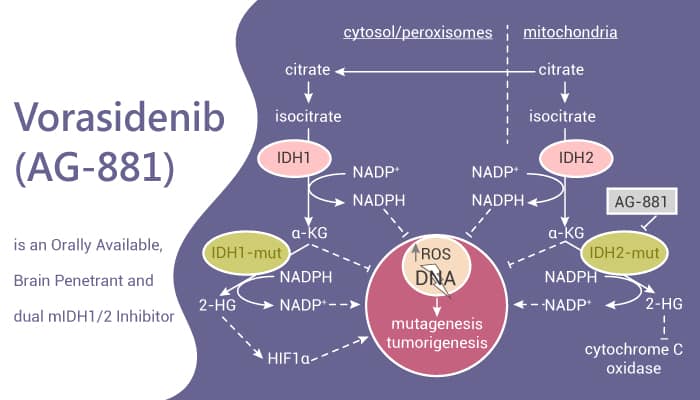Isocitrate dehydrogenases 1 and 2 (IDH1/2) are homodimeric enzymes. They catalyze the conversion of isocitrate to α-ketoglutarate (α-KG) in the tricarboxylic acid cycle. However, mutant IDH1/2 (mIDH1/2) reduces α-KG to the oncometabolite 2-hydroxyglutarate (2-HG). Inhibition of the mutant IDH (mIDH) protein represents a targeted approach to cancer treatment for patients. They harbor an IDH1 and/or an IDH2 mutation. Vorasidenib (AG-881) is an orally available, brain penetrant and potent inhibitor of isocitrate dehydrogenase (IDH) 1 and IDH2 mutant proteins. It exhibits nanomolar inhibition of D-2-HG. The IC50 ranges of 0.04~22 nM against IDH1 R132C, IDH1 R132G, IDH1 R132H, and IDH1 R132S and 7~14 nM against IDH2 R140Q and 130 nM against IDH2 R172K. In addition, AG-881 has strong antiproliferative activity. It inhibits human glioblastoma U-87 MG pLVX-IDH2 R140Q-neo, fibrosarcoma HT-1080, and neurosphere TS603 cells, all with IC50 values of less than 50 nM.

In pharmacological studies, Vorasidenib exhibits excellent brain penetration and dose-dependently reduced D-2-HG levels. Twice-daily dosing of AG-881 in the HT1080 (mIDH1-R132C) and U87 (mIDH2-R140Q) mouse models reduced tumor 2-HG levels by >96% at doses ≥30 mg/kg. In the orthotopic glioma model (mIDH1-R132H), brain tumor 2-HG levels are reduced by >97% at doses ≥0.1 mg/kg. In pharmacokinetics studies, AG-881 also shows rapid oral absorption and relatively low total body plasma clearance in mice (0.406 L/hr/kg) and rats (0.289 L/hr/kg).
All in all, AG-881 is a potent inhibitor of the mIDH1 and mIDH2 proteins. It suppresses 2-HG production in enzymatic, cell-based, and in vivo systems. The suppression of 2-HG levels by AG-881 results in alterations of cellular downstream markers. Thus, it leads to a release from blockage of tumor cell differentiation.
Reference:
Ma T, et al. J Med Chem. 2018 Oct 25;61(20):8981-9003.